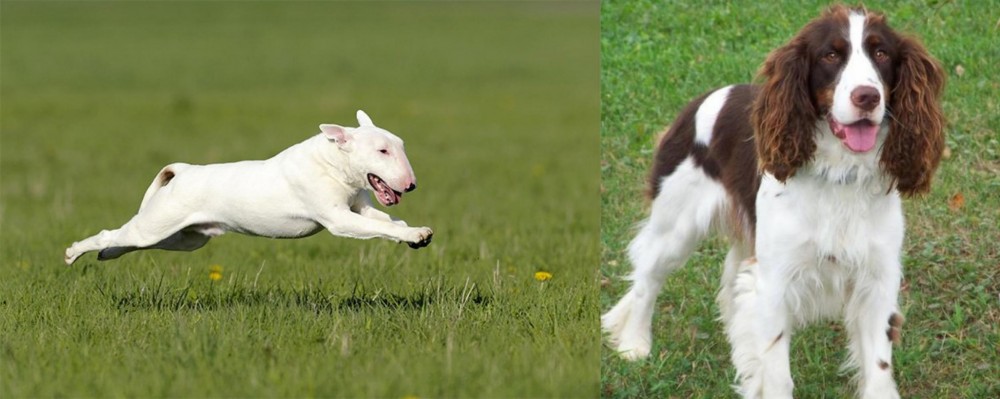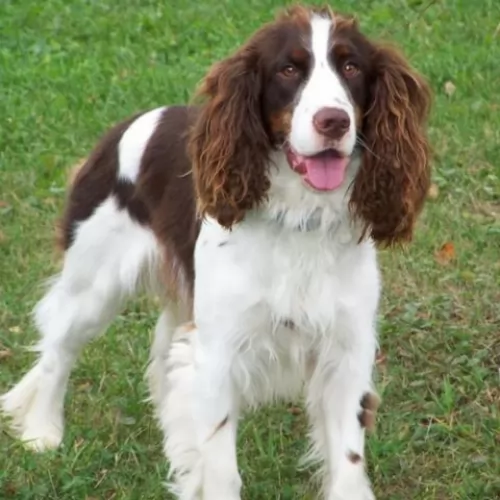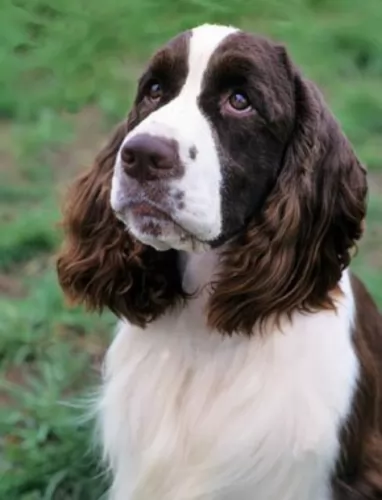 Petzlover
Petzlover Both Bull Terrier and English Springer Spaniel are originated from United Kingdom. Bull Terrier may grow 10 cm / 4 inches higher than English Springer Spaniel. Both Bull Terrier and English Springer Spaniel are having almost same weight. Both Bull Terrier and English Springer Spaniel has same life span. Both Bull Terrier and English Springer Spaniel has almost same litter size. Both Bull Terrier and English Springer Spaniel requires Low Maintenance.
Both Bull Terrier and English Springer Spaniel are originated from United Kingdom. Bull Terrier may grow 10 cm / 4 inches higher than English Springer Spaniel. Both Bull Terrier and English Springer Spaniel are having almost same weight. Both Bull Terrier and English Springer Spaniel has same life span. Both Bull Terrier and English Springer Spaniel has almost same litter size. Both Bull Terrier and English Springer Spaniel requires Low Maintenance.
 The Bull Terrier belongs to the Terrier group of dogs and this already tell you that he is highly energetic and that he is essentially intolerant of other pets.
The Bull Terrier belongs to the Terrier group of dogs and this already tell you that he is highly energetic and that he is essentially intolerant of other pets.
They are hunters by nature. The Bull Terrier is known as the Gladiator of the canine world. This breed came about through English breeders of the late 19th century, crossing old fighting dogs which carried Bulldog blood with Terriers. It was in the 1850s that James Hinks of Birmingham in the West Midlands was the first person to standardise breed type for the Bull Terrier. Hinks wanted his dogs to be white, and breeding was designed to achieve this.
Because of medical problems with the all-white dogs, Ted Lyon introduced color, using the Staffordshire Bull Terrier, and these became a separate variety. It is however, the white strain that is famous for pets as well as for show purposes.
 The English Springer Spaniel is one of many gun dog breeds that flush and retrieve. They descended from the Shropshire Spaniels and Norfolk Spaniels. The English Springer Spaniel is somewhat similar to the Welsh Springer Spaniel and believe it or not they are also closely related to the English Cocker Spaniel. In the last century the cockers and springers came from the same parents. The larger dogs flushed game and made game “spring” from the brush while the smaller dogs – the “cockers” would hunt woodcock. Eventually through specific breeding, the UKC of England recognized the “springers” as a separate breed.
The English Springer Spaniel is one of many gun dog breeds that flush and retrieve. They descended from the Shropshire Spaniels and Norfolk Spaniels. The English Springer Spaniel is somewhat similar to the Welsh Springer Spaniel and believe it or not they are also closely related to the English Cocker Spaniel. In the last century the cockers and springers came from the same parents. The larger dogs flushed game and made game “spring” from the brush while the smaller dogs – the “cockers” would hunt woodcock. Eventually through specific breeding, the UKC of England recognized the “springers” as a separate breed.
Sydenham Edwards, in 1801, proposed that the spaniels be divided into the Springing or Hawking Spaniel and the Cocking or Cocker Spaniel. From this point on there was a flourish in the development of spaniel breeds in the 19th century. They were usually named for the county in which they were founded or after the individual who developed them. In 1902, the English Springer Spaniel was officially recognized as its own breed by the UKC. It was not until 1910 that the AKC recognized them as well.
 The Bull Terrier is a strongly built, muscular dog with a distinctive egg-shaped head. The height of this dog is roughly 53 – 61cm and he weighs in at about 24 – 29kg. He has a short, dense coat which comes in different colors such as white, red, fawn and white or brindle.
The Bull Terrier is a strongly built, muscular dog with a distinctive egg-shaped head. The height of this dog is roughly 53 – 61cm and he weighs in at about 24 – 29kg. He has a short, dense coat which comes in different colors such as white, red, fawn and white or brindle.
The ears are medium sized and erect and the eyes are pig-like, small and dark. The medium length tail is carried slightly upwards.
The Bull Terrier is a determined, strong-willed, stubborn dog and he will require firm handling and training. With socialization and training, he becomes a friendly, loving dog who is good around children.
He tends to be possessive with his human family and their territory, making him aggressive with other pets. Bull Terriers actually have even temperaments and they are good, social dogs with people. He is courageous, brave, full of spirit and character.
 Among spaniels the English Springer is medium size and well compacted. Both the working dog and the show dog sport moderately long coats and a friendly tail. They both wear a gentle expression in their eyes. But there the commonality stops as the difference between the working English Springer Spaniel and the show line is greater in this breed than in any other. The gene pools have become almost separate over the last 70 years. If you put a field dog in the show ring they would not be able to compete. If you put a show line English Springer in the field, they would not have the stamina or speed for field trials.
Among spaniels the English Springer is medium size and well compacted. Both the working dog and the show dog sport moderately long coats and a friendly tail. They both wear a gentle expression in their eyes. But there the commonality stops as the difference between the working English Springer Spaniel and the show line is greater in this breed than in any other. The gene pools have become almost separate over the last 70 years. If you put a field dog in the show ring they would not be able to compete. If you put a show line English Springer in the field, they would not have the stamina or speed for field trials.
The field line has a coarser coat and less pendulous ears. They may dock a few inches off the tail, and they are much scruffier than the show dogs. On the other hand, the show dogs have dewlaps, pendant ears and dangling flews. They are heavier and thicker than the field dog. They have long muzzles, not so prominent eyes and docked tails. The English Springer Spaniel stands tall and proud, coming from an ancient line of Spaniels
 The way people bring their dogs up has a lot to do with the way they turn out. The Bull Terrier has often been thought to be a dangerous dog, but this is because of a bad upbringing.
The way people bring their dogs up has a lot to do with the way they turn out. The Bull Terrier has often been thought to be a dangerous dog, but this is because of a bad upbringing.
A dog like the Bull Terrier who has received firm, fair and loving training is an absolute pleasure to have as a pet. Yes, he is a strong willed, stubborn and intelligent dog and he has the make-up to turn out to be a handful. It is perhaps why he isn't the best choice for first-time dog owners who aren’t familiar with the breed and who don’t raise him the right way.
If you choose a Bull Terrier, bring him up correctly, have him trained and socialized and never neglect him and he is guaranteed to become a wonderful, loving family member.
 The English Springer Spaniel is a friendly dog who loves to please his people. They are great family dogs, easy-going and affectionate. In addition, they are attentive and alert which makes them such great hunting dogs. With exceptional speed and stamina, he needs activity to stimulate his body and brain. He is very intelligent. That intelligence can lead to stubbornness as well. He’d great with kids and good with other pets with perhaps the exception of cats. The breed is in love with water and will get in at any time.
The English Springer Spaniel is a friendly dog who loves to please his people. They are great family dogs, easy-going and affectionate. In addition, they are attentive and alert which makes them such great hunting dogs. With exceptional speed and stamina, he needs activity to stimulate his body and brain. He is very intelligent. That intelligence can lead to stubbornness as well. He’d great with kids and good with other pets with perhaps the exception of cats. The breed is in love with water and will get in at any time.
 Your Bull Terrier is a robust breed, but there are some health issues that you will want to be aware of. For instance, the white Bull Terrier is more prone to deafness than the Brindle or tri-colored Bull Terriers. With good food and lots of love and care, he can reach 14 years of age. However there are one or two ailments what you want to be aware of.
Your Bull Terrier is a robust breed, but there are some health issues that you will want to be aware of. For instance, the white Bull Terrier is more prone to deafness than the Brindle or tri-colored Bull Terriers. With good food and lots of love and care, he can reach 14 years of age. However there are one or two ailments what you want to be aware of.
This is a common orthopedic condition with dogs, affecting both knees and resulting in loss of function and discomfort. Patellar luxation can sometimes come from a traumatic injury to the knee. However, with non-traumatic patellar luxation, the femoral groove for the knee cap is shallow or absent.
Not every variety of skin cancer in dogs is caused by sun exposure, but sun damage to the skin of the pure white Bull Terrier can be a factor. Dogs with white coats are more susceptible to sun damage. Speak to your vet about symptoms so that a physical examination will reveal the reason for sores on the skin.
 Not an uncommon issue for most medium to smaller sized dogs. It can lead to lameness or arthritis.
Not an uncommon issue for most medium to smaller sized dogs. It can lead to lameness or arthritis.
Loss of vision due to a deterioration of the retina.
Clubs form in the retinal tissue and can lead to blindness.
The twisting or distention of the stomach that effects dogs with deep chests and can lead to death if not treated immediately.
 The Bull Terrier is a stocky, robust breed and he will need plenty of exercise. He thrives on a good run, long walks and ball games. He is notoriously destructive, so you need to recognize this before you buy such a dog, because simply putting one in your back-yard and ignoring him will make him aggressive and destructive. This is a dog that needs lots of physical as well as mental exercise.
The Bull Terrier is a stocky, robust breed and he will need plenty of exercise. He thrives on a good run, long walks and ball games. He is notoriously destructive, so you need to recognize this before you buy such a dog, because simply putting one in your back-yard and ignoring him will make him aggressive and destructive. This is a dog that needs lots of physical as well as mental exercise.
With the short coat, Bull Terriers are easy to groom, and a brushing twice a week will keep the coat in tip top condition. He will also love the time you spend with him. Shedding of hair with the Bull Terrier is more frequent in the Spring and Fall.
Nail clipping and brushing of teeth are two other grooming routines for your dog. Remember that with teeth brushing, don’t be tempted to use human toothpaste as this can be toxic for your pet. Speak to your vet if in any doubt about how to brush your pet’s teeth.
 The English Springer Spaniel can gain weight easily and obesity is one of the biggest health issues for this breed. Feed them a high quality dry dog food. Working dogs need more energy and more calories than the inactive dog. An active member of the breed should have around 1353 calories every day in at least 2 meals if not 3. Do not feed a large meal before or after strenuous exercise as this can cause bloat.
The English Springer Spaniel can gain weight easily and obesity is one of the biggest health issues for this breed. Feed them a high quality dry dog food. Working dogs need more energy and more calories than the inactive dog. An active member of the breed should have around 1353 calories every day in at least 2 meals if not 3. Do not feed a large meal before or after strenuous exercise as this can cause bloat.
In addition to the health issues listed above the English Springer Spaniel is also prone to:
This is a genetic condition where the body cannot use the carbohydrates it takes in and convert it to energy. This is identified as a blood disorder.
Causes seizures but can be treated with medications.
With longer , droopy ears, infection is always a possibility. Clean them regularly and keep them dry.
The working English Springer Spaniel is a very energetic dog requiring daily exercise and loving to play. They love walks and hikes. They can excel in competitions such as rally, agility, tracking, field and obedience.